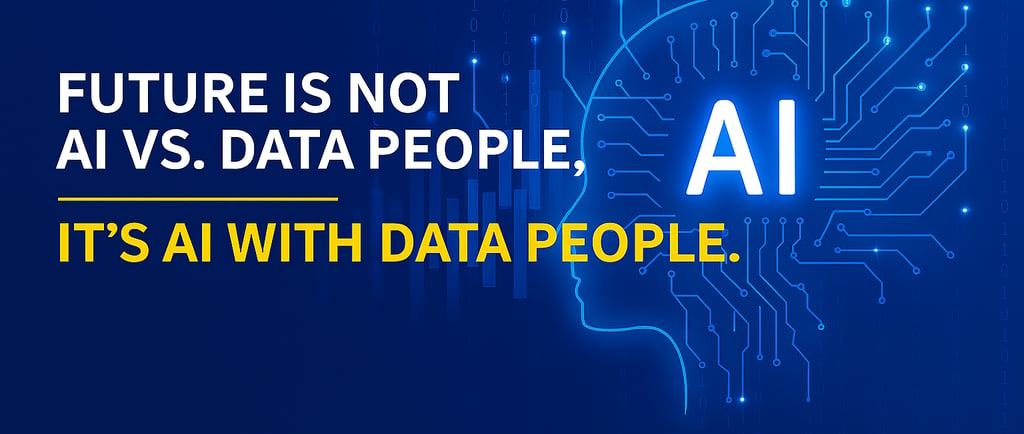How AI is Reshaping Data Engineering, Data Science, and Database Administration
For Data Engineers, Scientists and Administrators
DATA & AI TECH
Varun Goguri-Data & AI Specialist
10/7/20253 min read


Artificial Intelligence (AI) is transforming every corner of the data world. From how we store and process information to how we extract insights, the traditional boundaries between Data Engineers, Data Scientists, and Database Administrators (DBAs) are rapidly shifting.
As AI systems become smarter, faster, and more autonomous, data professionals are being challenged to adapt, collaborate, and reimagine their roles in this new ecosystem.
The New Data Reality: AI at the Core
AI thrives on data; it’s both the fuel and the engine of modern intelligence. But the explosion of data sources, formats, and real-time streams has changed how teams approach their work.
Data Engineers are now building AI-ready data pipelines, incorporating real-time processing, data quality validation, and automation. Platforms like Databricks, Snowflake, and Azure Synapse are being enhanced with AI capabilities that simplify complex ETL tasks.
Data Scientists are shifting from manual feature engineering to AI-assisted modeling, leveraging tools like AutoML, LLMs, and generative AI to accelerate experimentation and deployment.
DBAs are witnessing the rise of autonomous databases and AI-driven monitoring, reducing manual tuning while increasing focus on security, governance, and optimization.
Real-World Examples: AI in Action
The transformation isn't theoretical—it's happening now across industries:
In Healthcare: AI-powered data pipelines are enabling real-time patient monitoring systems, where Data Engineers build infrastructure that processes millions of sensor readings while Data Scientists deploy predictive models for early intervention.
In Finance: Traditional DBAs are evolving into platform engineers who manage AI-enhanced fraud detection systems that automatically tune database performance based on query patterns and workload predictions.
In Retail: E-commerce teams are using AI-assisted data platforms where engineers, scientists, and analysts collaborate in unified environments, reducing the time from data ingestion to actionable insights from weeks to hours.
Collaboration Over Competition
Rather than replacing jobs, AI is redefining collaboration among these roles. The line between traditional responsibilities is blurring:
Data Engineers and DBAs are merging into Data Platform Architects, ensuring performance, scalability, and AI compatibility.
Data Scientists and Engineers increasingly share DevOps and MLOps practices, working together to deliver continuous, data-driven intelligence.
Cross-functional teams are becoming essential — where understanding AI workflows is as important as knowing SQL or Python.
Emerging Roles and Skills
This evolution is creating entirely new career paths:
ML Platform Engineers bridge the gap between infrastructure and machine learning, building scalable systems for model training and deployment.
Data Quality Engineers focus specifically on ensuring AI systems receive clean, validated data through automated testing and monitoring frameworks.
AI Ethics Officers work alongside technical teams to ensure responsible AI implementation, addressing bias detection and fairness in algorithms.
The most in-demand skills now combine traditional data expertise with:
Understanding of LLM integration and prompt engineering
Cloud-native architecture and containerization
Real-time streaming technologies (Kafka, Flink, Spark Streaming)
MLOps tools and practices (MLflow, Kubeflow, SageMaker)
Data governance and regulatory compliance (GDPR, CCPA)
Challenges Ahead
The shift isn’t without hurdles:
Data Quality remains a critical barrier — AI models are only as reliable as the data behind them.
Ethical Data Use & Bias Management are rising priorities as organizations deploy AI systems that impact real decisions.
Skill Gaps are widening, with many professionals needing to upskill in cloud, AI integration, and machine learning fundamentals.
Practical Steps to Stay Relevant
For professionals looking to thrive in this new landscape:
Start Small: You don't need to become an AI expert overnight. Begin by exploring how AI tools can augment your current role—whether that's using ChatGPT for documentation, experimenting with AutoML platforms, or learning basic prompt engineering.
Build Cross-Functional Knowledge: If you're a Data Engineer, learn the basics of model deployment. If you're a Data Scientist, understand data pipeline architecture. DBAs should explore cloud-native database solutions.
Contribute to Open Source: Engage with AI/ML projects on GitHub to gain hands-on experience with cutting-edge tools and practices.
Join Communities: Participate in data and AI communities, attend meetups, and engage in discussions to stay current with industry trends.
Certifications Matter: Consider pursuing certifications in cloud platforms (AWS, Azure, GCP), AI/ML specializations, or modern data tools to validate your evolving skill set.
The Future of Data Professionals
The data community stands at a turning point.
AI isn’t replacing Data Engineers, Scientists, or DBAs — it’s amplifying their capabilities.
Those who embrace AI-driven tools, understand data ethics, and foster collaboration will lead the next generation of intelligent data systems.
The future isn’t “AI vs. Data People”, it’s AI with Data People.
Final Thought
If you work with data, now is the time to experiment, learn, and evolve.
The combination of human expertise and artificial intelligence will define the next era of innovation.
What's your experience with AI in your data role? How are you adapting to these changes? Share your thoughts in the comments—I'd love to hear your perspective.
About the Author: Varun Goguri is a Technology & Fitness Enthusiast exploring the intersection of AI, data engineering, and innovation. Connect with me to discuss the future of data and technology.
#AI #DataScience #DataEngineering #Database #MachineLearning #Innovation #Technology #ArtificialIntelligence #DataAnalytics #CloudComputing #MLOps #FutureOfWork